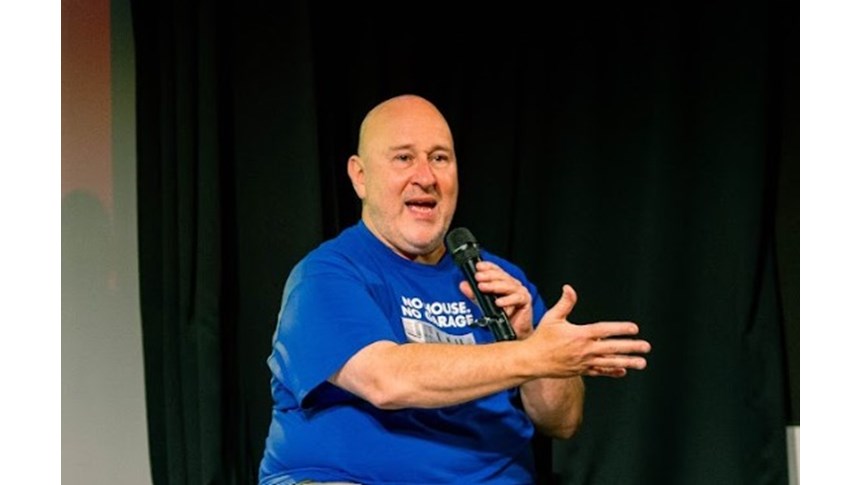Ever wondered how Kiss FM got started? We were fortunate enough to find out for ourselves at one of our Music Industry Mondays events where we sat down with Lindsay Wesker, seasoned music industry veteran and the man behind some of the most incredible music innovations, including MTV Base.
His journey has not only witnessed the transformation of genres but has played a crucial role in shaping the music landscape itself. From his early days as a vinyl enthusiast to becoming a prominent figure in the music business (and eventually LCCM tutor!), Lindsay's story is one of passion, inspiration and a true commitment to the art form.
To watch the full talk with JD, click here.
From vinyl junkie to big-time journalist
Lindsay’s journey started in 1967 when his grandmother purchased his first vinyl record for him. Little did he know that this was just the beginning of a lifelong journey with music that would see some huge successes. Describing himself as a vinyl junkie (and a bit of a music know-it-all in the nicest way) didn’t just remain as a fun quirk but led him to a full-time career as a music journalist.
The transition from vinyl enthusiast to music journalist marked the first significant chapter in Lindsay's professional life. Thanks to his insatiable appetite for all things music, and by eventually coming to know pretty much everything there is to know about music, Lindsay was able to even surprise and impress the artists he would interview with his knowledge. Do you know who produced your favourite song? Lindsay probably does.
On this journey, he was able to do the impossible and actually meet his heroes. Everyone says never meet your heroes and admittedly, according to Lindsay, some of them were a little bit of a letdown (not naming names) but if it means you got to meet the likes of James Brown and Chaka Khan, who’s really complaining?
Kiss FM, MTV Base, MTV Dance… the list goes on
The early 90s was a pivotal time in Lindsay's career. Kiss FM started off as a pirate radio station at first, meaning it was technically illegal and shouldn’t have been running at all. But Lindsay was giving the people what they wanted.
At that time, no radio stations were playing what Kiss FM was playing. It was just “club music” and “no one wanted to listen to that”. But the demand for the tracks from London club DJs was there. Kiss FM was bringing the underground up to the surface. Songs like ‘I Like To Move It’ only became known because it was played continuously on Kiss. Sometimes you have to break the law a little to make some changes. Wouldn’t recommend this as a daily mantra but in this case, it worked.
After a while, being on the run (literally) and broadcasting from people’s bedrooms became the norm until Lindsay did the wild thing and started the process of making Kiss FM a legal radio station. Everyone thought he was mad, but clearly, he proved them wrong.
This wasn’t just a mark of success for Kiss FM but for Lindsay’s career as a whole.
Lindsay’s influence soon extended over to MTV where he ended up creating MTV Base and later MTV Dance and MTV Hits. This platform became a beacon for dance music enthusiasts, elevating the genre to mainstream popularity.
Thoughts on the music industry today and AI
During the conversation with JD, Lindsay shared his thoughts on the music industry today. Clearly, there’s been a massive difference between the industry back then and today. There are about 120,000 songs uploaded to Spotify every single day. Back when Lindsay was popping off, there were just 40 singles a week. How do new artists navigate this rapidly changing world?
Lindsay says you should be working 25 hours a day. There’s no doubt that it’s a lot tougher to stand out today but it has also never been easier to make a career for yourself. Use social media to your advantage and generate buzz, let the big companies chase you, not the other way around. Also, make sure your followers aren’t just a number on your phone screen.
Engage with your audience, turn them into fans who make the effort to keep up to date with you and who want to buy your music and show up to gigs. Yeah, 60k followers sounds good but how many of those people are actually buying albums?
Although he doesn’t have a Spotify account himself, a sort of mini protest to Spotify’s billionaire owner who’s a bit shady (what billionaire isn’t), he does like the idea of Spotify’s AI DJ. Having something tell you what music is good and the ones you should be listening to is more than helpful nowadays. There’s just so much out there, a helping hand would actually be really nice.
Lindsay’s music journey is definitely up there with the most inspirational and downright impressive. If you want to hear more stories like this and learn more about the music industry in general, you can grab some free tickets here to join us for our next Music Industry Mondays.
